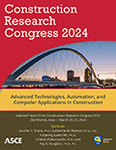Pipeline Integrity Analysis through Data-Driven Approaches
Publication: Construction Research Congress 2024
ABSTRACT
Pipelines are the most widely used energy transportation infrastructure in the world. Pipeline failures caused by aging, corrosion, cracks, and damages may result in irreparable societal, economic, and environmental consequences. Therefore, pipeline safety and integrity are crucial to the robustness of modern societies. Robust failure models have the potential to effectively reduce the emergent risk and the probability of hazards in pipeline construction, and extend the service life of pipeline infrastructure. In this paper, we apply a data-driven approach, Gaussian Process Regression (GPR), to predict the failure of the oil pipeline. We train and test the models based on historical public data from a report on European cross-country oil pipelines. The best model type is selected with different variable combinations. Variables such as pipeline diameter, service, and gross spillage volume are considered in the models. The data-driven pipeline failure model will provide pipeline operators with an effective way to evaluate pipeline conditions and guide pipeline rehabilitation and maintenance. The model can also be used to support pipeline integrity management based on the ASME code, which can extend the service life of the pipeline infrastructure and bring benefits to the environment and the economy.
Get full access to this article
View all available purchase options and get full access to this chapter.
REFERENCES
Akpomuvie, O. B., and Orhioghene, B. 2011. “Tragedy of commons: Analysis of oil spillage, gas flaring and sustainable development of the Niger Delta of Nigeria.” Journal of Sustainable Development, 4(2), 200–210.
Aldosari, H., Elfouly, R., and Ammar, R. 2020. “Evaluation of Machine Learning-Based Regression Techniques for Prediction of Oil and Gas Pipelines Defect.” 2020 International Conference on Computational Science and Computational Intelligence (CSCI), Las Vegas, NV, 1452–1456.
ASME. 2021. Managing System Integrity of Gas Pipelines: ASME Code for Pressure Piping, B31: Supplement to ASME B31. 8. New York: The American Society of Mechanical Engineers.
Henry, N. F., and Henry, O. N. 2019. “Wireless Sensor Networks based Pipeline Vandalisation and Oil Spillage Monitoring and Detection: Main Benefits for Nigeria Oil and Gas Sectors.” The SIJ Transactions on Computer Science Engineering & Its Applications (CSEA), 07(04), 01–07.
Fang, W., Wu, J., Bai, Y., Zhang, L., and Reniers, G. 2019. “Quantitative risk assessment of a natural gas pipeline in an underground utility tunnel.” Process Safety Progress, 38(4).
Fayaz, M., Ahmad, S., Hang, L., and Kim, D. 2019. “Water Supply Pipeline Risk Index Assessment Based on Cohesive Hierarchical Fuzzy Inference System.” Processes, 7(4), 182.
Jernelöv, A. 2010. “The Threats from Oil Spills: Now, Then, and in the Future.” AMBIO, 39(5–6), 353–366.
Keprate, A., Ratnayake, R. M. C., and Sankararaman, S. 2017. “Adaptive Gaussian process regression as an alternative to FEM for prediction of stress intensity factor to assess fatigue degradation in offshore pipeline.” International Journal of Pressure Vessels and Piping, 153, 45–58.
Larive, J. F. 2022. “Performance of European cross-country oil pipelines.”.
McFarland, J. M. 2008. Uncertainty analysis for computer simulations through validation and calibration. PhD dissertation. Nashville, TN: Vanderbilt University.
Senouci, A., Elabbasy, M., Elwakil, E., Abdrabou, B., and Zayed, T. 2014. “A model for predicting failure of oil pipelines.” Structure and Infrastructure Engineering, 10(3), 375–387.
Ulapane, N., Alempijevic, A., Vidal-Calleja, T., Miro, J. V., Rudd, J., and Roubal, M. 2014. “Gaussian process for interpreting pulsed eddy current signals for ferromagnetic pipe profiling.” 2014 9th IEEE Conference on Industrial Electronics and Applications, Hangzhou, China, 1762–1767.
Ulapane, N., Thiyagarajan, K., and Kodagoda, S. 2020. “Hyper-Parameter Initialization for Squared Exponential Kernel-based Gaussian Process Regression.” 2020 15th IEEE Conference on Industrial Electronics and Applications (ICIEA), Kristiansand, Norway, 1154–1159.
Information & Authors
Information
Published In
History
Published online: Mar 18, 2024
ASCE Technical Topics:
Authors
Metrics & Citations
Metrics
Citations
Download citation
If you have the appropriate software installed, you can download article citation data to the citation manager of your choice. Simply select your manager software from the list below and click Download.
